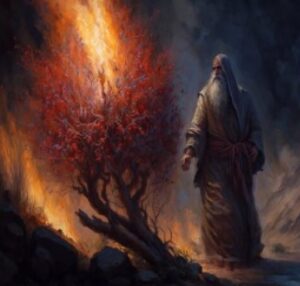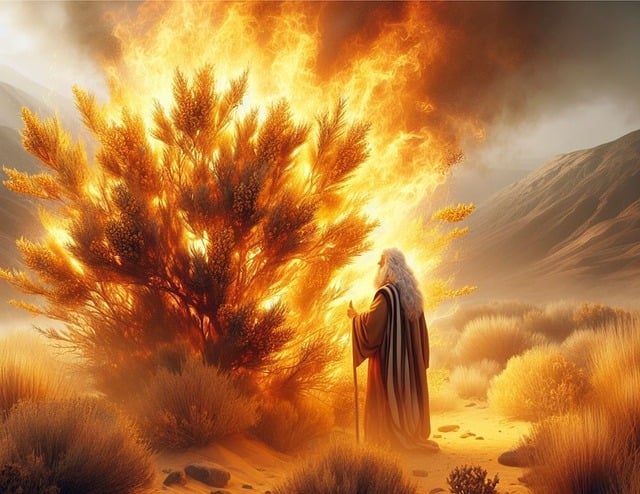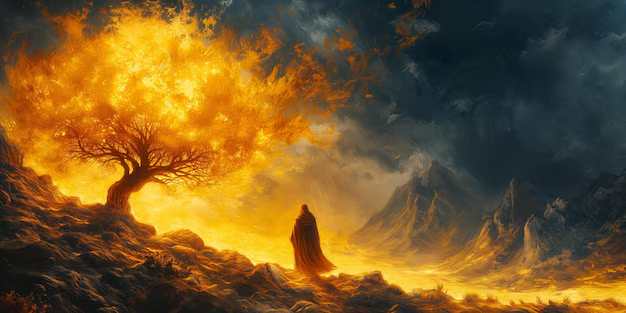The Quran recounts numerous exchanges between Moses (Musa) and Pharaoh, with one of the most profound narratives appearing in Surah Ash-Shu’ara (‘The Poets’). In these verses, Moses addresses Pharaoh with kindness, inviting him to recognize God’s mercy and His eternal paradise. However, Pharaoh’s reaction is one of mockery and arrogance. He reminds Moses of his past misdeeds and the privilege of being raised in the royal palace, questioning his gratitude.
Moses responds humbly, acknowledging his earlier mistake of taking an innocent life out of ignorance. He then points out that his upbringing in the palace was only due to Pharaoh’s decree to kill all newborn Israelite boys. Moses clarifies his purpose, emphasizing his mission as a Messenger of God and reminding Pharaoh of his oppression of the Children of Israel.
“Moses said, ‘I did it then, when I was ignorant. So I fled from you when I feared you. But my Lord granted me wisdom and made me one of His messengers. And this is the favor you reproach me with—while enslaving the Children of Israel.’” (Quran 26:20-22)
Pharaoh questions Moses about the identity of God, to which Moses proclaims the Creator’s authority over all existence:
“Moses replied, ‘The Lord of the heavens and the earth and everything in between, if you seek certainty.’” (Quran 26:23)
Pharaoh mocks Moses’ words and accuses him of madness, but Moses continues to declare God’s dominion. Angered, Pharaoh threatens to imprison Moses unless he ceases his message. Undeterred, Moses promises to present a clear sign of his divine mission.
Magic Versus Divine Power
During that era, Egypt was steeped in magic and illusion, with schools dedicated to teaching these arts. Pharaoh misinterpreted Moses’ miracles, assuming they were advanced magical tricks. When Moses demonstrated two of his signs—his staff transforming into a serpent and his hand shining bright and white after being drawn from his cloak—Pharaoh dismissed them as mere illusions. Determined to expose Moses, Pharaoh summoned the most skilled magicians from across Egypt, promising them wealth and prestige in exchange for defeating him.
A grand contest was arranged, set on a festival day to maximize public attendance and ensure widespread exposure to Pharaoh’s supposed superiority. The magicians, confident in their abilities, asked Moses to begin. However, Moses insisted they cast their spells first.
“They said, ‘O Moses, will you throw first, or shall we be the ones to throw?’ Moses said, ‘You throw.’ So they threw their ropes and staffs, and by their magic, it seemed as if they were moving like snakes.” (QURAN 20:65-66)
The ground appeared to be alive with writhing serpents conjured by the magicians. The spectacle amazed the crowd, but Moses stood firm, placing his trust in God. God reassured Moses, instructing him to throw his staff.
The Truth is Revealed
When Moses obeyed, his staff transformed into a mighty serpent that devoured the illusions of the magicians. The crowd erupted in awe, and the magicians, masters of their craft, immediately recognized that Moses’ act was no illusion. They fell to the ground in prostration, proclaiming their belief in the God of Moses and Aaron:
“And the magicians fell down in prostration. They declared, ‘We believe in the Lord of all worlds, the Lord of Moses and Aaron.’” (Quran 26:46-48)
Enraged by their defiance, Pharaoh accused the magicians of conspiring with Moses. He threatened them with severe punishment—amputation and crucifixion—if they refused to recant. However, their faith remained steadfast, and they accepted their fate, seeking forgiveness from God for their past misdeeds.
“They said, ‘No harm will come to us, for we will return to our Lord. We hope that our Lord will forgive our sins for being the first to believe.’” (Quran 26:50-51)
Pharaoh’s Rage and Futile Plans

Moses and Aaron departed the scene as Pharaoh’s fury intensified. Humiliated and desperate to regain control, Pharaoh ordered the public execution of the magicians to serve as a warning. Yet, the seeds of doubt had been planted among the people.
Pharaoh turned to his chief minister, Haman, and commanded the construction of a towering structure to reach the heavens, arrogantly claiming he would confront Moses’ God. This act symbolized Pharaoh’s delusion and defiance, but it only led to his ultimate ruin:
“And Pharaoh said, ‘O Haman, build for me a tower so that I may reach the heavens and look at the God of Moses, though I am sure he is a liar.’ Thus, Pharaoh’s evil deeds were made appealing to him, and he was hindered from the right path.” (Quran 40:36-37)
The Legacy of Moses’ Victory
The magicians who began the day as skeptics and opportunists became believers through their recognition of God’s omnipotence. Their transformation underscores God’s mercy and His readiness to forgive those who turn to Him with sincerity and repentance. Moses’ triumph over Pharaoh’s magicians remains a timeless testament to the power of faith and truth against falsehood and deception.
This story serves as a reminder that God’s guidance and support prevail, even in the face of overwhelming odds. Faith in Him brings clarity and strength, enabling believers to overcome any challenge.



